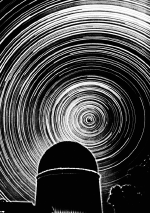Bartusiak has the reputation of a "popularizer" of scientific matters, but I suspect that she writes more profoundly than that. Way back in 1996, RALPH published an extremely silly review of her Thursday's Universe: A Report from the Frontier on the Origin, Nature, and Destiny of the Universe. In that, we called her "a crackerjack writer." We also headlined her wonderful quote from Edward Tryon: In answer to the question of why it happened, I offer the modest proposal that our Universe is simply one of those things which happen from time to time.Bartusiak is indeed a crackerjack presenter. She is also opinionated. She tells us, for example, that Edwin Hubble had the unscientific habit of fudging his past. He said that he had practiced law in Louisville, Kentucky; he probably never did. He claimed to have fought in the trenches in WWI --- but the U. S. Army has no record of such. He was also taken with smoking pipes, wearing plus-fours, and speaking with a fake English accent.
Bartusiak's real heroes are the silent laboring types, like Milton Humason, who worked with Hubbell on Mount Wilson, heroically posted at the top of the 100-inch telescope ... in the cold, exposing plates night after night, keeping extensive and careful notes. Or Percival Lowell's associate, Vesto Silpher, "An unassuming and dignified man who always wore a suit and tie to work when not observing."
He preferred to correspond with his peers rather than travel and often had others present his findings.
 Then there is Lemaître, who wrote up his startling concept of an ever-expanding universe in an obscure Belgian journal eighty years ago. Rephrasing his theory brings Bartusiak to new heights, making something unbearably complex into words that even I can almost understand: "The galaxies are not rushing through space but instead are being carried along as space-time inflates without end. The embedded galaxies are simply going along for the ride."
Then there is Lemaître, who wrote up his startling concept of an ever-expanding universe in an obscure Belgian journal eighty years ago. Rephrasing his theory brings Bartusiak to new heights, making something unbearably complex into words that even I can almost understand: "The galaxies are not rushing through space but instead are being carried along as space-time inflates without end. The embedded galaxies are simply going along for the ride."
That's why the recession occurs in a specific way: A galaxy twice as far from us recedes twice as fast; a galaxy three times farther travels three times faster, and so on.
Lemaître's conclusions "offered an astounding vision of how the universe operates. But no one noticed --- no one at all."
Lemaistre was a bit of a poet himself. In 1950 he wrote in his final book, The Primeval Atom,
The evolution of the world can be compared to a display of fireworks that has just ended: some few red wisps, ashes, and smoke ... Standing on a well-chilled cinder, we see the slow fading of the suns, and try to recall the vanished brilliance of the origin of the worlds.


 Then there is Lemaître, who wrote up his startling concept of an ever-expanding universe in an obscure Belgian journal eighty years ago. Rephrasing his theory brings Bartusiak to new heights, making something unbearably complex into words that even I can almost understand: "The galaxies are not rushing through space but instead are being carried along as space-time inflates without end. The embedded galaxies are simply going along for the ride."
Then there is Lemaître, who wrote up his startling concept of an ever-expanding universe in an obscure Belgian journal eighty years ago. Rephrasing his theory brings Bartusiak to new heights, making something unbearably complex into words that even I can almost understand: "The galaxies are not rushing through space but instead are being carried along as space-time inflates without end. The embedded galaxies are simply going along for the ride."